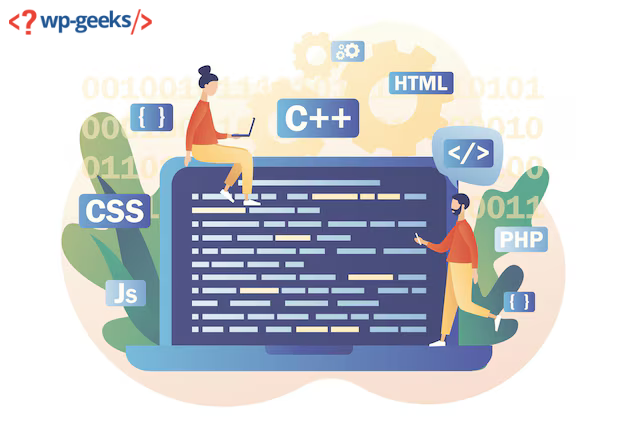From Code to Content Management: Migrating HTML to WordPress
In the dynamic realm of web development, the transition from static HTML websites to dynamic Content Management Systems (CMS) like WordPress signifies a significant evolution. This shift not only enhances website functionality but also streamlines content management processes, empowering businesses and individuals to create, update, and optimize their online presence with ease.
Understanding the Transition: HTML to WordPress Conversion
Migrating from traditional HTML code to a WordPress CMS entails a strategic process aimed at harnessing the full potential of dynamic web management. This conversion not only unlocks a myriad of features but also facilitates seamless content management, search engine optimization (SEO), and scalability for websites of all sizes and industries.
Advantages of HTML to WordPress Conversion
Responsive Design and Mobile Optimization:
WordPress themes are designed to be responsive, ensuring that your website looks great and functions well on all devices, including desktops, laptops, tablets, and smartphones.
By adopting a responsive design, you can provide an optimal viewing experience for your visitors, regardless of the device they use to access your website. This not only improves user satisfaction but also contributes to better search engine rankings, as Google prioritizes mobile-friendly websites in its search results.
Dynamic Content Updates:
With HTML websites, making updates or changes to the content often requires manual editing of each individual page, which can be time-consuming and prone to errors.
In contrast, WordPress allows you to update content dynamically through its intuitive interface. Whether you're adding new blog posts, updating product listings, or making changes to your site's navigation menu, you can do so quickly and easily from the WordPress dashboard, without the need to touch any code.
Built-in Blogging Capabilities:
WordPress originated as a blogging platform and continues to offer robust blogging features, making it an ideal choice for businesses and individuals looking to incorporate a blog into their website.
By html to wordpress conversion, you gain access to powerful blogging tools, including categories, tags, comments, and RSS feeds, allowing you to create and manage engaging blog content that attracts and retains visitors.
Scalability and Future Growth:
As your business grows and evolves, your website needs to adapt to accommodate new features, products, and services. WordPress offers unparalleled scalability, allowing you to expand and customize your website as needed.
Whether you're adding new pages, integrating e-commerce functionality, or implementing advanced features through plugins and custom development, WordPress provides a flexible platform that can scale with your business and support your long-term growth objectives.
Access to a Vibrant Ecosystem:
WordPress boasts a thriving ecosystem of developers, designers, and third-party providers who contribute to its ongoing development and expansion.
By migrating to WordPress, you gain access to a wealth of resources, including themes, plugins, tutorials, forums, and support communities, that can help you optimize and enhance your website's performance, functionality, and user experience.
Improved Security and Maintenance:
WordPress is continually updated to address security vulnerabilities and enhance performance, ensuring that your website remains secure and reliable.
With automatic updates and built-in security features, such as user authentication, password protection, and data encryption, WordPress provides a safe and stable environment for your website, reducing the risk of security breaches and downtime.
Streamlined Content Management:
WordPress's intuitive dashboard allows for effortless content creation, editing, and organization, eliminating the need for manual HTML coding.
Users can easily update website content, add new pages, and upload media files without any technical expertise.
Enhanced SEO Capabilities:
WordPress offers built-in SEO features and plugins like Yoast SEO, enabling users to optimize content, meta tags, and URLs for better search engine visibility.
Dynamic sitemaps, clean permalink structures, and mobile responsiveness contribute to improved search rankings and user experience.
Expanded Functionality with Plugins:
The extensive WordPress plugin directory provides access to thousands of plugins catering to various functionalities, from contact forms to e-commerce solutions.
Users can integrate third-party services, add social media sharing buttons, and implement advanced features with ease.
The Conversion Process: HTML to WordPress Migration
The migration from HTML to WordPress involves several key steps to ensure a smooth transition and preserve website integrity:
Content Evaluation and Planning:
Assessing existing HTML content, including text, images, and multimedia elements.
Planning the structure of the WordPress site, organizing content into categories, tags, and pages for better navigation.
Theme Selection and Customization:
Choosing a WordPress theme that aligns with the website's design aesthetic and functionality requirements.
Customizing the theme's appearance, layout, and features to match the branding and user experience goals.
Content Migration and Integration:
Converting HTML content into WordPress-friendly formats, including posts, pages, and custom post types.
Migrating multimedia assets, such as images and videos, and updating internal and external links for seamless navigation.
SEO Optimization and Testing:
Implementing SEO best practices, including keyword optimization, meta tags, and schema markup.
Conducting thorough testing to ensure cross-browser compatibility, responsiveness, and functionality across devices.
Leveraging WordPress Beyond Migration
Once the migration process is complete, users can leverage WordPress's robust features to enhance their website's functionality and user experience:
Content Creation and Management:
Utilizing WordPress's visual editor and Gutenberg block editor to create engaging, multimedia-rich content.
Leveraging custom post types, taxonomies, and custom fields for organizing and structuring content effectively.
Community and Support:
Accessing the vibrant WordPress community for assistance, advice, and collaboration.
Seeking support from WordPress forums, documentation, and professional development resources for ongoing optimization and troubleshooting.
Conclusion
Transitioning from HTML to WordPress represents a paradigm shift in web development, offering unparalleled flexibility, functionality, and scalability. By embracing the power of content management and leveraging WordPress's robust features, businesses and individuals can elevate their online presence, engage their audience, and achieve their digital goals with confidence. Additionally, convert photoshop to WordPress to enhance design capabilities and further customize your website's appearance and functionality.


Comments
Post a Comment